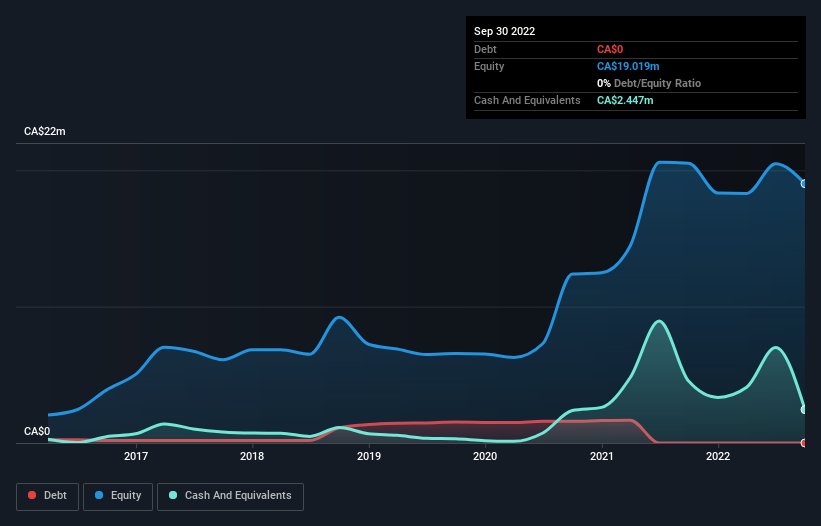We Think HPQ Silicon (CVE:HPQ) Needs To Drive Business Growth Carefully
We can readily understand why investors are attracted to unprofitable companies. For example, although Amazon.com made losses for many years after listing, if you had bought and held the shares since 1999, you would have made a fortune. Nonetheless, only a fool would ignore the risk that a loss making company burns through its cash too quickly.
So should HPQ Silicon (CVE:HPQ) shareholders be worried about its cash burn? For the purposes of this article, cash burn is the annual rate at which an unprofitable company spends cash to fund its growth; its negative free cash flow. Let's start with an examination of the business' cash, relative to its cash burn.
See our latest analysis for HPQ Silicon
How Long Is HPQ Silicon's Cash Runway?
A company's cash runway is calculated by dividing its cash hoard by its cash burn. As at September 2022, HPQ Silicon had cash of CA$2.4m and no debt. In the last year, its cash burn was CA$4.0m. That means it had a cash runway of around 7 months as of September 2022. To be frank, this kind of short runway puts us on edge, as it indicates the company must reduce its cash burn significantly, or else raise cash imminently. Depicted below, you can see how its cash holdings have changed over time.

How Is HPQ Silicon's Cash Burn Changing Over Time?
Because HPQ Silicon isn't currently generating revenue, we consider it an early-stage business. Nonetheless, we can still examine its cash burn trajectory as part of our assessment of its cash burn situation. Given the length of the cash runway, we'd interpret the 30% reduction in cash burn, in twelve months, as prudent if not necessary for capital preservation. HPQ Silicon makes us a little nervous due to its lack of substantial operating revenue. We prefer most of the stocks on this list of stocks that analysts expect to grow.
How Hard Would It Be For HPQ Silicon To Raise More Cash For Growth?
While HPQ Silicon is showing a solid reduction in its cash burn, it's still worth considering how easily it could raise more cash, even just to fuel faster growth. Generally speaking, a listed business can raise new cash through issuing shares or taking on debt. Many companies end up issuing new shares to fund future growth. By comparing a company's annual cash burn to its total market capitalisation, we can estimate roughly how many shares it would have to issue in order to run the company for another year (at the same burn rate).
HPQ Silicon has a market capitalisation of CA$92m and burnt through CA$4.0m last year, which is 4.4% of the company's market value. That's a low proportion, so we figure the company would be able to raise more cash to fund growth, with a little dilution, or even to simply borrow some money.
Is HPQ Silicon's Cash Burn A Worry?
On this analysis of HPQ Silicon's cash burn, we think its cash burn relative to its market cap was reassuring, while its cash runway has us a bit worried. We don't think its cash burn is particularly problematic, but after considering the range of factors in this article, we do think shareholders should be monitoring how it changes over time. Separately, we looked at different risks affecting the company and spotted 7 warning signs for HPQ Silicon (of which 3 are a bit unpleasant!) you should know about.
If you would prefer to check out another company with better fundamentals, then do not miss this free list of interesting companies, that have HIGH return on equity and low debt or this list of stocks which are all forecast to grow.
Valuation is complex, but we're here to simplify it.
Discover if HPQ Silicon might be undervalued or overvalued with our detailed analysis, featuring fair value estimates, potential risks, dividends, insider trades, and its financial condition.
Access Free AnalysisHave feedback on this article? Concerned about the content? Get in touch with us directly. Alternatively, email editorial-team (at) simplywallst.com.
This article by Simply Wall St is general in nature. We provide commentary based on historical data and analyst forecasts only using an unbiased methodology and our articles are not intended to be financial advice. It does not constitute a recommendation to buy or sell any stock, and does not take account of your objectives, or your financial situation. We aim to bring you long-term focused analysis driven by fundamental data. Note that our analysis may not factor in the latest price-sensitive company announcements or qualitative material. Simply Wall St has no position in any stocks mentioned.
About TSXV:HPQ
HPQ Silicon
Engages in the development of technologies that transforms quartz into silicon materials and related derivatives in Canada.
Slight risk with mediocre balance sheet.
Market Insights
Community Narratives




